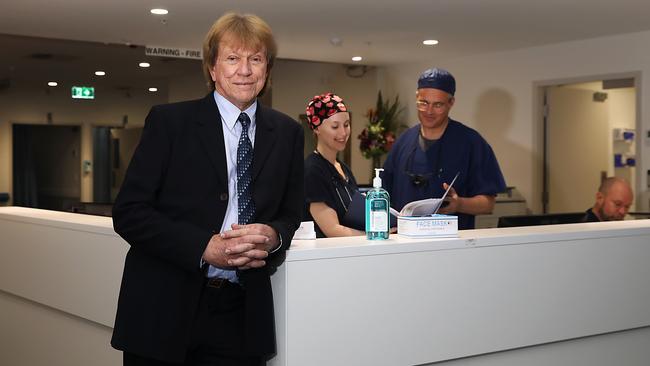Medibank set to buy third hospital as its unveils $250m war chest
After securing a minority stake in East Sydney Private two years ago, Australia’s biggest health insurance provider is in the final stages of acquiring its third hospital.

Medibank has set aside up to $250m as it transitions from hospital funder to hospital owner, and is close to securing its third deal with doctors as it advances its short-stay, no gap model.
The $10bn Docklands-headquartered company is in the final stages of acquiring a third hospital on Australia’s east coast. Like its other hospital investments in Woolloomooloo and Melbourne, it will take a minority stake to maintain clinical independence.
The model is focused on shortening hospital stays for patients, allowing them to recuperate in their own home and receive follow-up care from a multidisciplinary team, including nurses and allied health professionals such as physiotherapists.
Savings are then diverted into surgery fees, eliminating out-of-pocket fees, which can top more than $3000 in capital city markets, with at home rehabilitation costing about a third of the cost of a hospital stay
Medibank chief executive David Koczkar said Medibank was in “constant dialogue” with doctors and there is “lots of interest” in striking hospital partnerships.
“We’re absolutely expecting it (a third hospital) and we’re making an announcement shortly on that,” Mr Koczkar said.
“These are new innovative agreements. We’ve outlined an aspiration of putting aside $150-250m of capital to fund this sort of growth. In parallel, we’re talking to hospital groups and expanding our arrangements to also deliver options for the consumer, so we’re making progress on both fronts.
“The trends we‘re seeing internationally, one is the consumerisation of health, putting the customer at the centre of health. Second is focus on prevention. And we’re certainly investing significantly.”
Short stay hospitals currently perform 1 per cent of Australia’s 100,000 joint replacements each year. This compares to 30-40 per cent in other countries where the short-stay model is more mature.
During the pandemic more Australians have been choosing to undergo rehabilitation in their homes, with Mr Koczkar revealing that one in four Medibank customers were now electing that option in the past year.
Medibank began investing in hospitals in August 2020 when it acquired a 49 per cent stake in East Sydney Private Hospital at Woolloomooloo. It has since struck a joint venture with a group of 42 doctors to build a new $64m hospital in Melbourne.
While saving customers money, the strategy has attracted criticism from private hospital and doctor groups, who have branded it a step towards US-style managed care, in which health insurers have a greater say on patient treatment.
But Medibank says clinical autonomy is maintained, highlighting it has taken minority stakes with doctors retaining majority ownership.
Mr Koczkar said that the entire private health sector – insurers, hospitals and doctors – needed to become more united to prevent steep premium hikes and return to thousands of Australians withdrawing from private healthcare.
“The known issues in health can no longer be ignored; our health system is fatigued, and the pace of change is not keeping up with our growing health needs. We are at a critical juncture as we emerge from the pandemic and it’s widely recognised that we all need to move with greater urgency,” Mr Koczkar said after announcing last Thursday that Medibank’s health insurance profit jumped 10 per cent to $592.6m, while revenue firmed 2.7 per cent to $6.86bn.
Covid-19 has reversed a trend of mostly young and healthy Australians tearing up their health insurance policies, with Medibank signing on almost 61,000 policyholders in the year to June 30 – a 3.2 per cent increase on the previous year.
But UBS analyst Scott Russell said “feedback suggests an ultimate reversion to pre-Covid participation and claims”, citing a survey by the investment bank late last month. Although, he said there was now improved sentiment towards the value of private health.
Meanwhile, Bupa Asia-Pacific chief executive Hisham El-Ansary has warned of a near doubling of waiting lists across the public health system if health insurance participants fall by 10 per cent as the pandemic sugar hit wears off.
“My belief, however, is that the structural factors that were diminishing the value proposition for our young people pre-Covid have not changed, and over the medium term we will continue to see declines,” Mr El-Ansary said







